本帖最后由 视奸用小号 于 2024-5-22 11:49 编辑
Welcome!This is a special version of the Fallout Apocrypha. It breaks down the Fallout TV series on Amazon Prime. This first installment lays out a foundation for the review and examines the characters and their arcs. The second installment (in a day or two, also here) will break down the lore in the series. The “Fallout Apocrypha” is a continuation of the Fallout Bible, and you can find installments in my Medium gallery if you want to review any of it — it may help answer feelings on Bethesda (no, I don’t hate them, nobody I know on Fallout New Vegas does), my critiques of Bethesda’s previous Fallouts, and other Fallout information. Also, there are plenty of other reviews of the series on the net. I encourage you to check them out to get a range of perspectives. Tim Cain, for example, one of the core creators of Fallout has a YouTube channel that’s worth checking out not just for Fallout, but for a whole range of development advice — you can find it here: CainOnGames Obviously, this review has spoilers — but some of the feedback here won’t make sense unless you’ve watched the series, so… …let’s get started!Long ago when I was pitching games, I was told that James Cameron had an approach for pitching — rather than listening to a horrible droning PPT, he apparently asked to see what the movie poster for the film being pitched would be. I thought this was genius, because a good movie poster is intended to encapsulate the qualities of the show and set viewer expectations at a glance. It’s like a game box cover in some respects. Do you want to experience the entertainment being shown? That being said, the poster for the Fallout TV series is this: 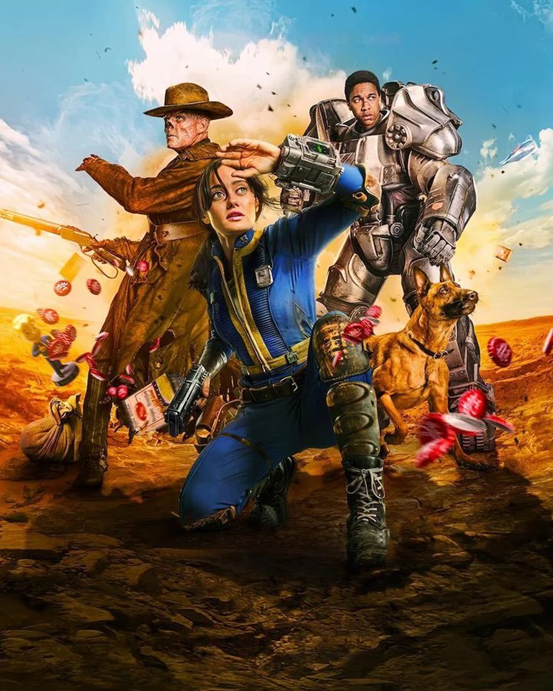
…and it’s spot on, both good and bad. What makes *you* qualified to write a review?Good question. A few things: I am not a Microsoft employee.¹ I once got an offer to work on F1 from Tim Cain, which I refused and still kick myself about to this day.² I worked on Fallout 2 and Van Buren at Interplay, then Fallout New Vegas and most of the New Vegas DLCs after that. Tim and I did “star” in Nuka-Break, the Fallout limited series, way back when. My appearance is especially egregious. I wrote installments of the Fallout Bible and the Apocrypha here on Medium. I have watched Memento and Westworld. Probably like you, I like the Fallout franchise. Lastly, I have no skin in this game. It can be very tempting to say “oh, you’re pandering, you’re a fan boy, you’re envious/bitter, you hate Bethesda,” blah blah. But really? I don’t give a shit, and never would have watched the show (I didn’t care) or written this if people online hadn’t pinged me “blaming” me for the series’ choices which I never made. I’m more than happy to give a show praise when it’s deserved, and I do for some points below because there are some things I think the show does well. So regardless of my lack of desire to see it, I gave it a chance. I watched it, took notes, watched it a second time with more notes, then sent a letter of congratulations to Todd — regardless of my opinion, it’s a huge achievement to see Fallout as an official series. It can’t have been cheap, and it can’t have been easy. So kudos to them. [1] BTW, if you are a Microsoft employee, it’s time to unionize. [2] On the plus side, the writing for Fallout 1 went to Scott Bennie at Interplay instead, which was great because Scott was a great writer and added a lot of quality to Fallout. He also was the one who gave me my first home in California, and he will be missed. “Hey, dummy, you missed something or got X, Y, Z wrong…”…and if so, feel free to point it out — I’m sure there’s elements I missed. Even watching the series a second time, I still didn’t feel as if I had gotten everything. Why watch it twice? Well, because lore research is work, but it’s worthwhile work. I also did this because it would be hypocritical of me to be critiquing someone not putting in the work to research the lore if I don’t do the same. Reasons to Discount This ReviewLet me do some work out there for the naysayers who want easy excuses to discount this review: 1. I did not play Fallout 4 extensively beyond 1 hour of the opening and watching 2 of the endings before deciding I wouldn’t play any more of it. Any lore hooks shown in F4 (like Hancock turning into a ghoul overnight) I am blissfully unaware of. 2. I didn’t like the executive producer Jonathan Nolan’s previous work, Westworld, beyond Season 1. I have watched all the seasons, to my regret. The mention of Westworld is especially apt, because Westworld is a fictional locale that feels real when you watch it, while Fallout is supposed to be in the real world but somehow feels incredibly fake throughout — and I’m curious what would have happened if they’d applied the real world sensibility to some locales, people, and scenes — the birthday party at the outset comes close, and it’s a great scene, but that’s about it. Instead, everything feels… sugary. I do feel that the Fallout series has the same problem Westworld does — there’s a lot of characters that no one seems to know what to do with. And it was very amusing to see connections between F4 and Westworld, now that I realized that Nolan and Howard were in touch. If you’ve seen the synth dunking chambers in both F4 and Westworld, you know what I mean. 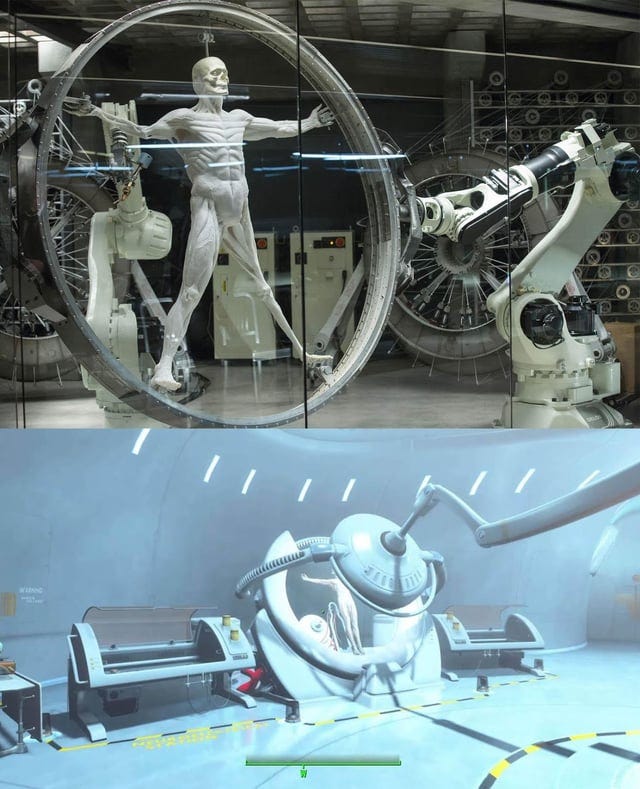
Westworld Top, F4 Bottom.If you love Westworld in its entirety and feel it’s the most amazing piece of cinema ever, then you will find very little to like in the following review. 3. In many ways (start lighting torches, pitchforks come later), this whole series reminded me of the final season of Star Trek’s Picard. If you haven’t seen it, Season 3 of Picard is a masterclass in fan service, gives the audience arguably everything they’ve ever wanted, and is wildly entertaining. It is also a largely terrible, random story that had me smh repeatedly. The craftsmanship outside of fan service moments felt non-existent and non-cohesive. If you think Picard S3 was the best, narratively solid thing you ever saw in this universe or any other, then you can stop reading this review right now because you’re not going to like my takes. 4. Annnnnd the last reason to discount this review is because we’re both entitled to an opinion. If you like something, you like it. You can’t argue with that. I can’t argue with that, and I wouldn’t — the way you feel about something is one of the most honest emotions you can have. And if I like something, I like it, and that’s fine — because it’s fine for both of us to have an opinion. So read on! Entertaining and CraftsmanshipI have two categories when evaluating movies: Entertainment and Craftsmanship (Quality). The reason for this is there are bad movies I love even though I know they are bad (Resident Evil 1), and there are good movies I don’t enjoy watching, even if well-crafted (Natural Born Killers).³ It also applies to more modern sci-fi — I’d argue that Silo and Foundation are much higher quality shows, but they didn’t carry the same raw entertainment value that Fallout does. So how does Entertaining vs. Craftsmanship play out in Fallout? Was Fallout entertaining? Yes. The Fallout series is an entertaining spectacle that works well as a trailer for the current state of the Fallout franchise. This is important because there’s nothing angrier than a player with a false expectation, and as such, the Fallout TV series is an appropriate on-ramp to the current state of Fallout with little to disappoint those who have only the show as a tutorial. This means if you watch the series and play Fallout 4 or 76, chances are, you’ll feel right at home. I’d argue if the series felt like a more serious Fallout 1 story, then you tried to play Fallout 4, you wouldn’t be very happy and would be like, “what the hell is this?” (This is one of the reasons why I don’t play F4 or 76.) On Craftsmanship — is Fallout a good, thoughtful, well-paced series whose plot respects its own internal lore, its own dramatic payoffs, and uses foreshadowing effectively cinematically and narratively? Nope. I’ll address some of the biggest examples later. I didn’t even bother with most F1 and F2 contrasts because that was too easy (we already know there’s leagues of difference there just from the proximity of the new vaults’ placement to the original vaults, origin of ghouls, etc.) and unfortunately, those contrasts are not important. I know that me saying that will likely anger those who love the originals, but it’s true — those Fallouts are gone. Instead, I believe it’s a more valid comparison to drill down on how the show tried to craft its own internal lore, and see how their attempts succeeded and failed. The big ones I’ll address later on in Part 2 of the Review are the Vaults, the nature of Ghouls, the literal Power infrastructure in the wasteland, and some major themes like capitalism (which was never part of the original Fallout premise despite what you may think — capitalism equaling evil is a very modern shout topic, and it’s not surprising that Hollywood leans on that for a big reveal). Again, this doesn’t mean I didn’t enjoy watching it. I like watching a lot of bad shows and movies and there are some I could watch repeatedly and never get tired of it. While Fallout doesn’t quite hit this level, it’s definitely more entertaining than good. Did the show feel uneven? Yes. I didn’t have a problem with this except that it called attention to scenes that felt like a waste of time vs. could have been answering lore problems/showing more of the foundation of the world. While The Ghoul calls out the irritation of being sidetracked in one scene and you can hyuk-hyuk about him complaining about side quests, the issue is the writers have more control over a TV plot than a game plot, so they should use it, not embrace the game’s chaos. I mean, use every episode in a quality manner, that’s not so hard. Keep the pace consistent, keep the focus going where it needs to — that’s where TV shines, you can literally force the viewer to only look at what you want to see, unlike a video game. My feeling was, starting with Episode 5, things started going downhill and the problems grew. I think this is natural because the opening episodes focused more on immediate predicaments, but as the series and world opens up and the full motivations for the cast become more apparent, the larger questions start showing up, and those don’t have good answers. Now, I’m going to talk a little about lore, retcons, and older Fallouts vs. the series, and these don’t have good answers, either — and may be answers you don’t want to hear. [3] I call bad movies I find entertaining “popcorn movies” because I can watch them anytime, anywhere, and still enjoy them even as bad as they are. You probably have a list, too, but I think we’d be the same in that we would never recommend these movies to anyone as cinematic tours de force. The Fallout series doesn’t quite hit that bar of being infinitely rewatchable. Lore and RetconsMy belief is, in a perfect world where designers do their research, retcons aren’t necessary. If you’ve designed lore in the past, you often don’t need to retcon anything, you just need to explain more or find a way to “get to where you want the lore to go” from the previous roadmap. It would have been easy to do with Jet. It would have been easy to do with any Fallout 1 or 2 lore point vs. simply ignoring it. I do think if Bethesda did embrace this practice, they’d do a lot to reduce some frustration from players, but it does require research and work to do properly — and I admit, doing that level of research isn’t fun (this is coming from the guy who absorbed everything he could about Star Wars for Knights of the Old Republic II, including the Star Wars Christmas Special), but the rewards pay off for both the developer and the player. It makes the player’s experience in previous games more valued vs. discounted. So now for a question you may be surprised to hear me ask… *Were* the older Fallouts better?For those of you who swear by the older Fallouts, I did want to address some potential horse blinder aspects of “oh wow, the older Fallouts were so much better.” I mean Fallout 1 was. It was pretty damn good. And that voice cast! Dammmmn. However, Fallout 2 and what followed — the console game Brotherhood of Steel — weren’t as good. I’d argue they hurt the franchise more than people “blame” Fallout 3, 4, and 76 for doing. This is important to point out because I think there’s some kind of illusion out there that Fallout at Interplay was going amazingly well and keeping the franchise “on track”. It absolutely wasn’t, and it was definitely experiencing the same lore breaks and inconsistencies that fans bring up about more recent Fallouts. Everything back then wasn’t rosy, I just think sometimes people think it was. So I did want to point that out for the sake of contrast — there’s nothing to prove that had Interplay kept going with Fallout (even Van Buren) that things would have been awesome in the world of Fallout. In fact, if Bethesda hadn’t bought Fallout, I seriously doubt there would have been another Fallout, let alone at the scale of F3, F4, spinoffs, T-shirts at Target, and the TV series. While it’s easy to give that stuff the finger, it’s testament that a franchise in the right marketing hands can grow to something none of us would have expected… because at the last stages of Interplay, there was no confidence that that level of popularity would ever happen vs. the company going out of business. Does the series embody the core narratives of the early Fallouts?Ignoring the broken water chip nod, which was mostly confusing and embarrassing, what I’m referring to here is the core narrative theme of Fallout 1 — not the water chip, not the fight against the Master, but the idea that after your player character’s constant sacrifices, including risking your life to save Vault 13, it turns out the very ones you fought to save — the Vault Dwellers — decide that you’ve changed too much to return to life in the Vault, and they cast you out. 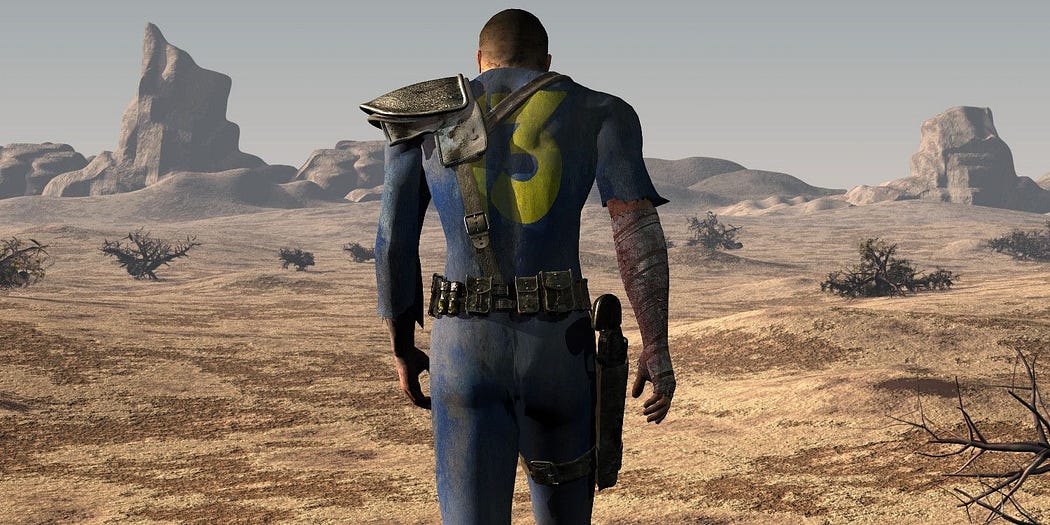
After all you’ve done, and all you’ve risked… you can’t go home again.This concept is embodied by the Vault Dweller walking off into the wastes at the end of Fallout 1. It’s essentially the bittersweet “you can’t go home again” narrative. For many, me included, that was one of the most powerful moments in the game, and it hit even harder than defeating the Master. Now, does the TV series come close in showing change in characters that may cause them to be ostracized by their own later on? (Lucy obviously being the most important one, although Norman factors in.) So far, easily yes. Lucy, the Ghoul, Maximus have all changed by the end of the series — for Lucy and Maximus, it’s the question of acceptance within their faction. Even minor characters, like Norman and Bert… er, Chet, go through considerable changes. Lucy definitely has changed compared to most of her Vault, and certainly enough to be eventually cast out… but read my minor point below (I’ll include any minor quibbles or notes at the end of each header, but recognize they are minor points). Minor Point: Going beyond the points above and speculating for the future, I also argue that in Lucy’s case, for the “Fallout 1 narrative” to work (Vault Dweller no longer being accepted home) this would require Norman being alive by the end or this story can’t work. The reason only Norman’s opinion matters is because everyone else in the Vaults is a clown, an idiot, or a bad guy whose opinion no viewer would care about. You wouldn’t care if the other Vault dwellers, Betty, Stephanie, Chet, or Woody cast you out because they aren’t people you respect or even on your side. However, with Norman being the brother of Lucy and being the only one in 33 who seems to be proactive, he’s the only one that plot point could effectively play off of. If you don’t understand this, ping me online and I’ll try and explain it better. Does the series embody the core narratives of later Fallouts (3, 4)?Yep, as soon as Lucy says, “I need to find my Dad.” Which has been the plot of most of the Bethesda Fallouts, so… yeah. 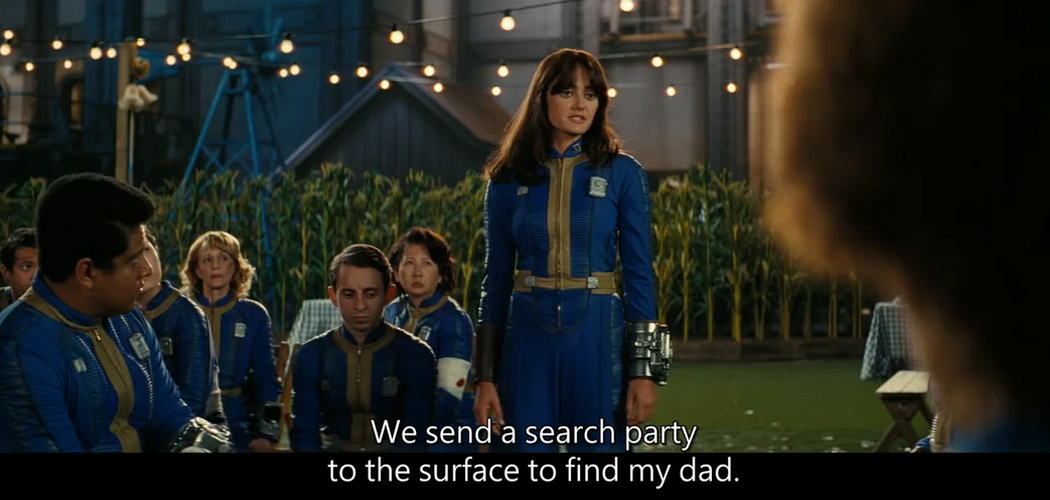
:: Wherre oh where has my evil Dad gone, where oh where can he beee ::Todd/Emil, please change the record, we get it. You miss your families. But does it have to be everybody’s problem?⁴ For the record, we used to have a similar trope at Black Isle which was “get killed, wake up from the dead,” which did make it into FNV, so we had our share of tired tropes, too, so don’t think I’m getting on my high horse here (or high Brahmin). Now that we’ve covered all the history and comparisons to the games, let’s dig into the craftsmanship of the show. [4] Am teasing. Uh, I hope. MusicSo just to get it out of the way, the music’s great and very much in keeping with Fallout. Even better, the lyrics emphasize what’s transpiring in the scene, and that’s pretty classy. Bravo, 10/10. Violence/GoreThis show is very violent and gory, and that’s true to the old Fallouts, and I was surprised by how much they leaned into it. Granted, there were parts I thought were unnecessary and sometimes didn’t make sense except for deus ex machina. As an example, Wilzig’s robot leg that simultaneously kills him felt unnecessarily gory in a way that made it seem implausible but worked for the not-quite-so-interesting choice of removing Wilzig’s character. #JusticeForWilzig Edit Correction: This is wrong. (Thx Timur and Voidy) I had forgotten it’s the cyanide pill that kills Wilzig. Thanks to the community for pointing it out. : ) CHARACTERS!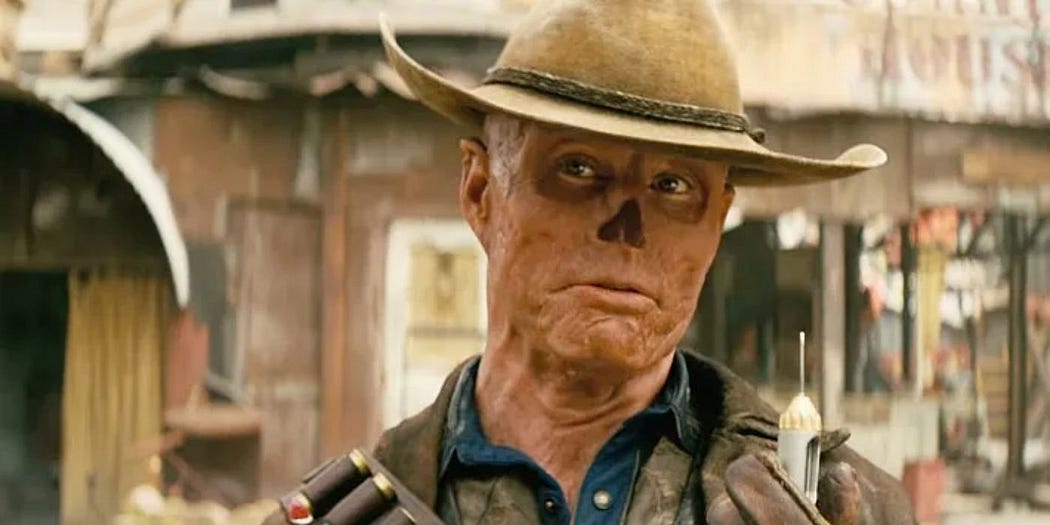
The Ghoul (Walton Goggins)Thought Cooper Howard/The Ghoul came out the best, although he has a bunch of wasted scenes that seem to be him in a room, threats in the room are traded, then he kills either some or all people in that room. Rinse and repeat. Walton Goggins I like a lot as an actor, and I was worried he would be sidelined or given a shallow role in the series. The series surprised me by making him part of the foundation of the rise of Vault-Tec. This was done in a way that felt plausible to me, emphasized the struggle going on in the world at the time, and also the internal struggle that Cooper was going through — the whole theme of being “big, ugly, and having dignity” is the challenge that The Ghoul faces. It’s all tied back to when Cooper’s character felt beholden to a movie script and shot an unarmed villain as he lay in the dirt — all that was great, imo, and I thought they did that well.⁵ This was one of the good things about the Super Duper Mart encounter — I liked the callbacks for the dignity check for The Ghoul and then seeing on the TV the very movie where he was first depicted as a “murderer” and not true to himself — it feels like Cooper’s remembering who he used to be while watching the TV show, which is great, and this happens without a word. Perfect. On a minor note, calling someone “the ghoul” in a world of ghouls in a non-ironic way is problematic. The ghoul drug/feral problems have been discussed online already and I’ll also cover it more extensively in Part 2, since it’s a mess. Right now, I’ll point to all the problems that make this worse tied to the Ghoul specifically: - The Ghoul is a Chem Fiend (on his actual character sheet), so I’m guessing this is why he ingests every drug he can find. There are two problems with this — one, it ends up confusing the anti-feral drug he consumes as it’s hard to isolate that it’s THAT drug that’s keeping him sane vs. other drugs. The second thing is the presence of all these drugs in his system makes me wonder, well, if Lucy’s tranq dart won’t work on him (Ep 2), why would an anti-feral drug if he’s such a “huge bucket of drugs”? - And more explicitly, the questions above don’t even work with the Chem Fiend Perk — that perk makes the duration of drugs last longer vs. what’s displayed in the show, which implies his body is more accepting of drugs, not fighting them like with the tranq dart.⁶ - The fact he’s a Cannibal, too, also confused the issue about the feral drug issue (other people online were speculating that by him consuming other ghouls he got more sane because they might have anti-feral serum in their flesh? But… Robert was feral, right?). Overall, this doesn’t work. - The idea that there’s a drug that turns people into ghouls in less than 15 minutes and heals all their wounds feels out of place and definitely doesn’t mesh with F1 and F2. This isn’t the show’s fault. - The Ghoul suddenly revealing that the Power Armor has a flaw that guarantees insta-kills is problematic based on the gunfight in episode 2. The fact he didn’t exploit the armor’s weakness when Maximus seemed to have the upper hand in Episode 2’s shoot out was… confusing in retrospect. There wasn’t really any explanation for why not use his knowledge there vs. later beyond crafting a dramatic moment in episode 8— at which point, most watchers aren’t going to remember episode 2 unless like me, you rewatch the series and questions come up.⁷ Minor point: Also, speaking of that fight, Maximus getting his superpowered leg stuck in floorboards felt flimsy as fuck — I was almost embarrassed for the choreographer because it didn’t sell it with the scene and props. On a positive note related to the Ghoul — while rewatching the series, I did like the callbacks to chickens that seemed to permeate the series — as an example with Cooper and his wife in the hot tub, and Cooper saying how much he’d like chickens on the ranch in Bakersfield (then remembering chickens were a feral ghoul test). It’s also a nice callback because Vault 12 in Fallout 1 was in Bakersfield, and that was where ghouls first appeared. : ) I hope that was intentional. [5] I’m biased about Goggins because we got to work with him on Prey, and that was a blast. Many thanks to Raphael Colantonio for pushing for my involvement, I loved working on Prey. [6] And before you say, “well, the tranq dart doesn’t work on The Ghoul because he’s a ghoul,” that’s not the explanation The Ghoul gives. He explicitly says the dart doesn’t work because there’s a huge amount of drugs in his system. [7] It might be possible it’s the tempered lining, but if so, you need to explicitly say that after the bloodbath in Episode 8, which could have been fixed by the Ghoul saying a single line before slaughtering the soldiers, “always said tempered lining could have helped with that flaw — but you all didn’t think before you suited up, did you?” 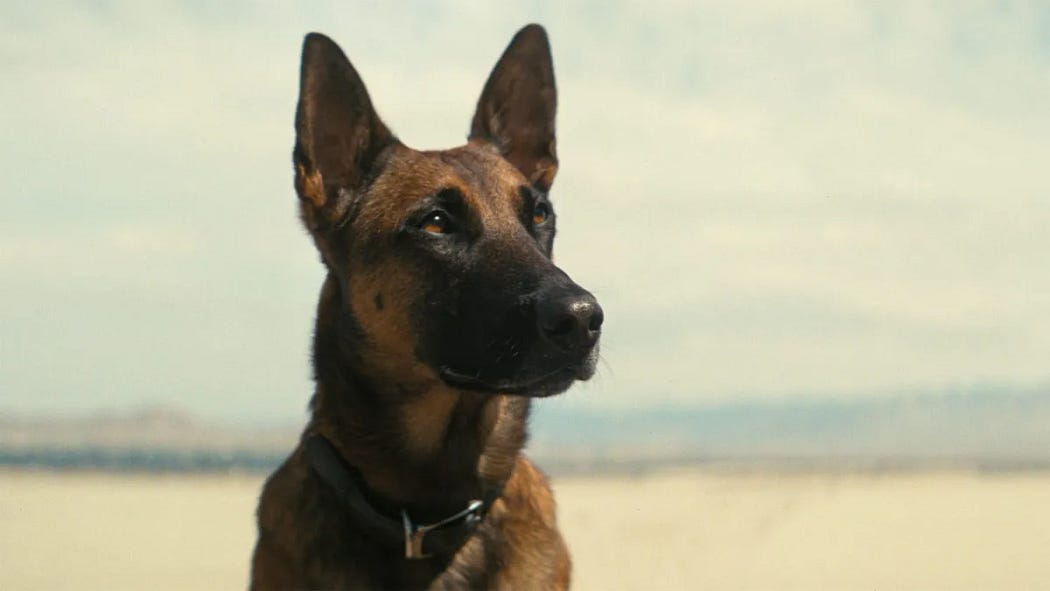
Dogmeat“Dogmeat,” (CX404) of all the characters, gets the short end of the stick. She shows up intermittently in ways that don’t quite work, her backstory is confusing, and it’s harder because Michael Emerson (Wilzig, Enclave scientist) is soooooo good at playing manipulative, smart, and evil characters, it was very hard for me to shake that he genuinely cared about Dogmeat… which apparently he did. I also couldn’t escape the fact that Emerson was ready to smuggle cold fusion out, but I wasn’t sure if he’d made actual plans for the dog to escape. He certainly didn’t have any plans established for escaping himself when push came to shove, which was weird if he was planning to flee the Enclave — I’d expect a smart scientist to already have an escape plan in place as soon as he injected himself in the neck.⁸ Instead, everything Emerson was doing made me feel he was setting Dogmeat up for an experiment, not that they were bonding. I mean, he works at the Enclave, ffs. After that, Dogmeat gets passed around, her name gets changed, she’s put in a Nuka Cola locker, and largely ignored. Worse, they don’t focus on one of the best narrative ties between The Ghoul and Dogmeat based on Roosevelt (Cooper Howard’s former dog) and not allowing dogs into the vault — that could have all been strengthened in a positive way, but there felt like there was not enough follow through on that theme. Disappointed, as are all dog lovers everywhere. [8] In fact, seeing his escape plan play out after that would have been great for his character rather than his random chaotic fleeing. 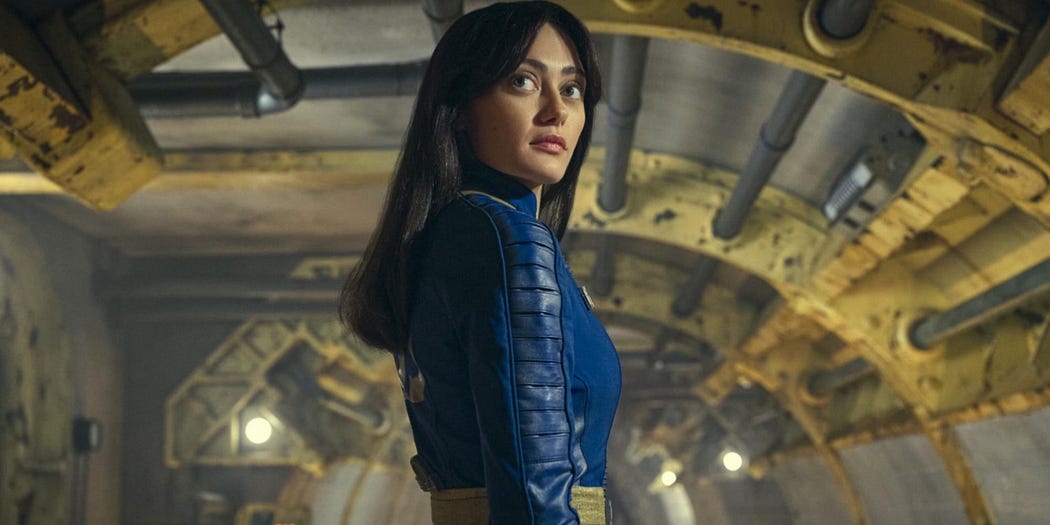
Lucy (Ella Purnell)Lucy was great, I thought Ella Purnell did a good job with a questionable script, and the earnestness of a Vault Dweller came through well. There were a lot of moments I liked with Lucy, but one thing I especially liked is when The Ghoul is kicking the hell out of everyone in Filly in Episode 2, it only takes Lucy to look at the Vault Boy bobble head to remind her of her meritocracy vault and “doing the right thing” that causes her to intervene. I love seeing moments like that in shows because it’s unspoken, and it relies on the audience to draw the connection to give it meaning — and in this show, moments like this are a bit rare. Also in Episode 2, the sequence where Lucy explains to Ma June about the purpose of the vaults I thought was great. It was a perfect example of the view of people who actually had to live and survive for 200+ years on the surface vs. a Vault Dweller suddenly showing up and preaching about how they’re coming to save everyone. The condescension of Lucy’s viewpoint in that scene, even if her character doesn’t mean to, was well done — the unintended arrogance of the Vault dwellers comes across as painful, and I appreciated that theme being exposed there. Minor Points: (Again, these “minor” points are very, very minor). One thing that bothered me: Lucy certainly didn’t seem dumb — so I didn’t understand why Lucy started tracking the bad guys from Vault 33 when they clearly left from Vault 32, the entrance of which can’t have been far — and the Vaults certainly weren’t disguising their presence.⁹ I liked the fact that Lucy didn’t know how to knife fight, and she found holding the raider’s knife as a weapon strange in Episode 1. I love little touches like that. [9] The fact the Vaults are so exposed and easy to find also didn’t feel appropriate for the series, more on this later. 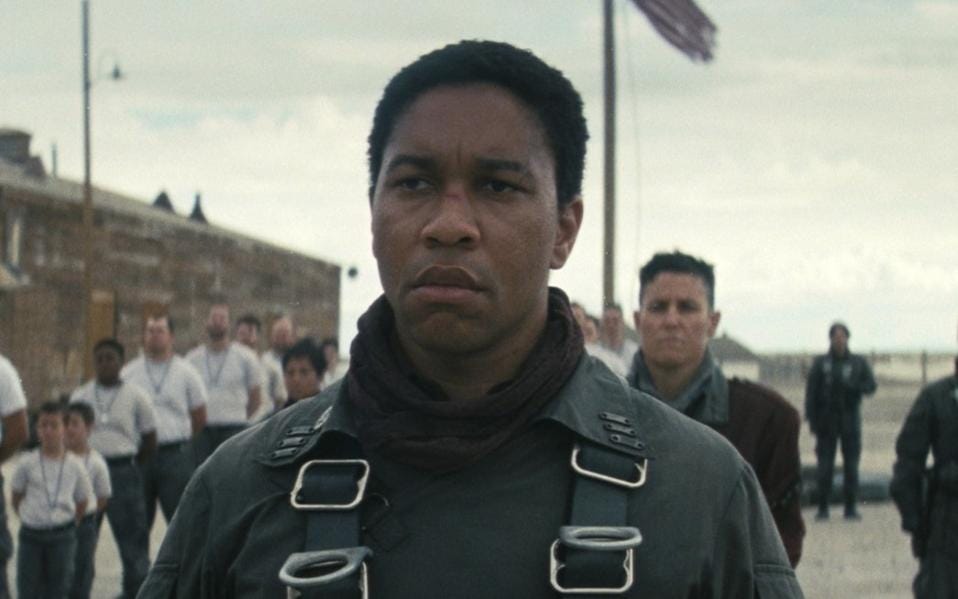
Maximus (Aaron Moten)Maximus’ behavior and the reasons for it were so confusing for much of the series, I found I couldn’t dig much into Maximus beyond a giant “?” There’s a type of acting called “facial acting” that I don’t think Maximus is very good at or was given poor direction for, and it would have helped in a lot of critical scenes. (Norman also has moments where it’s not clear what he’s reacting to or why, so it’s not just Maximus.) As an example, I honestly can’t tell if Maximus is happy or drugged during his sequence in Vault 4 — it turns out, he’s just happy to having the modern trappings of an actual “home”, but with the whole sinister mystery of Vault 4, kind of clouds the issue. This becomes worse when you’re trying to read his expression when he’s being questioned about murder or other crimes. I will say that after becoming aware of truths while first watching the show, then rewatching it with the knowledge of what Maximus had/hadn’t done, it made his characters and his motivations less cloudy, which I think the show could have benefited from setting up better. It was good that Maximus has a tie back to Shady Sands, but the Brotherhood angle there (the soldier who saves him) confuses that. Was it the Brotherhood who did it somehow at Hank’s urging? That doesn’t seem to fit. Or did the Brotherhood come after? Confusing, and some clarity there would have been nice. I did think that the conflicts Maximus faced were exactly the difficult moral decisions you may have to make in the wasteland. The awful choice Maximus faces with Knight Titus was a good one — you do a very bad thing for arguably a very good reason (kill a dickhead who hates you to prevent being executed). I did get an alternate take on the Titus scene from a Microsoft employee who (correctly) pointed out that the script for this feels really forced. It’s basically hammering you over the head to make sure you realize that Maximus has no choice, to the point of having Knight Titus repeatedly threaten Maximus just in case the audience doesn’t “get it”. So in that respect the craftsmanship of the dialogue is poor (I can see that perspective) and the staging of the scene feels a little less convincing. I still appreciated the choice Maximus faced, though. Also, the fact Maximus had to choose between eating popcorn and saving Lucy in Vault 4 was one of the low points for his character and the series. Minor Point: It was hilarious to see Titus running from the Bear. 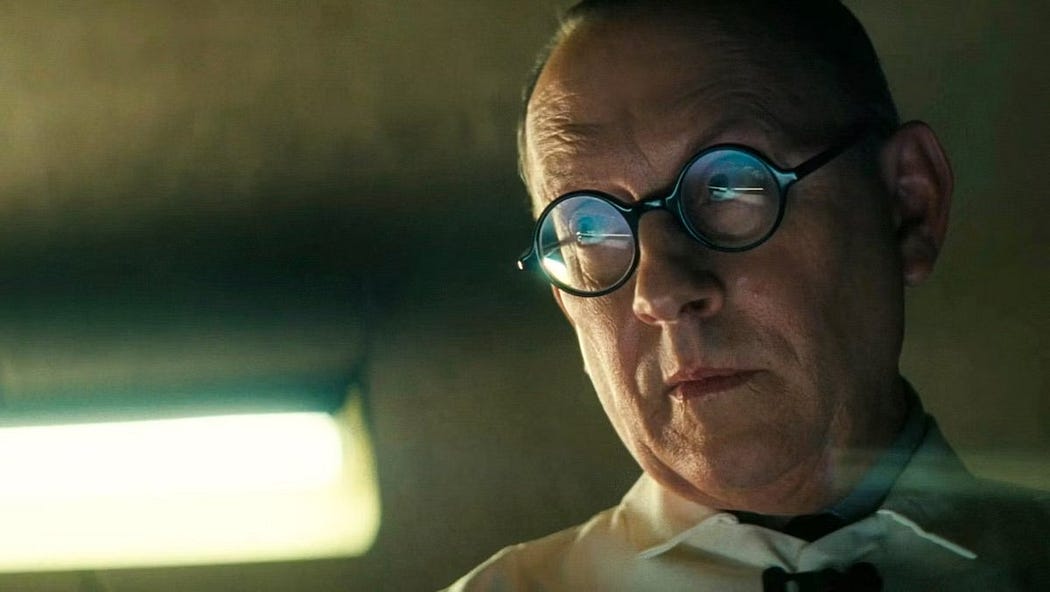
Wilzig (Michael Emerson)Not enough was provided to give context to his character in the series, I wish he’d been in it more. I did find myself fighting against typecasting Emerson’s normal roles to Wilzig,¹⁰ and then having to question the assumptions there in relation to his motivations. Michael Emerson and Lucy’s first scene around the campfire I thought was a great setup for bookending the themes of the series — I thought it was great for what was to come in Season 1 and what might come later in Season 2. Emerson largely carries that scene, so I’m mentioning it in his section vs. Lucy’s. Minor Point: Wilzig cannot be a very good scientist if he sees hazardous waste barrels and concludes that now is the right time to stop and plant his ass square on top of it (Ep 2). Or maybe he has low Perception, but I doubt it. [10] To explain, in both Lost and Evil, Emerson plays a highly intelligent manipulator antagonist, and he does it damn well. As such, it was hard to ignore those acting chops/roles since the Fallout series was still leveraging 90% of this same demeanor and then added 10% “I care about dogs” and “there might be a morally good (?) reason why I’m smuggling cold fusion out.” (Which isn’t answered at all.) Other Cast MembersActors like Chris Parnell don’t deserve to suffer for a bad script. Chris Parnell is very, very funny, but the script didn’t help him here. I loved seeing Matt Berry physically present in the series as a voice actor in Hollywood, and thought he was great as the voice for Mr. Handy. I also liked seeing him outside of just voice acting to have a scene with Goggins at the Vault-Tec party in the TV series. 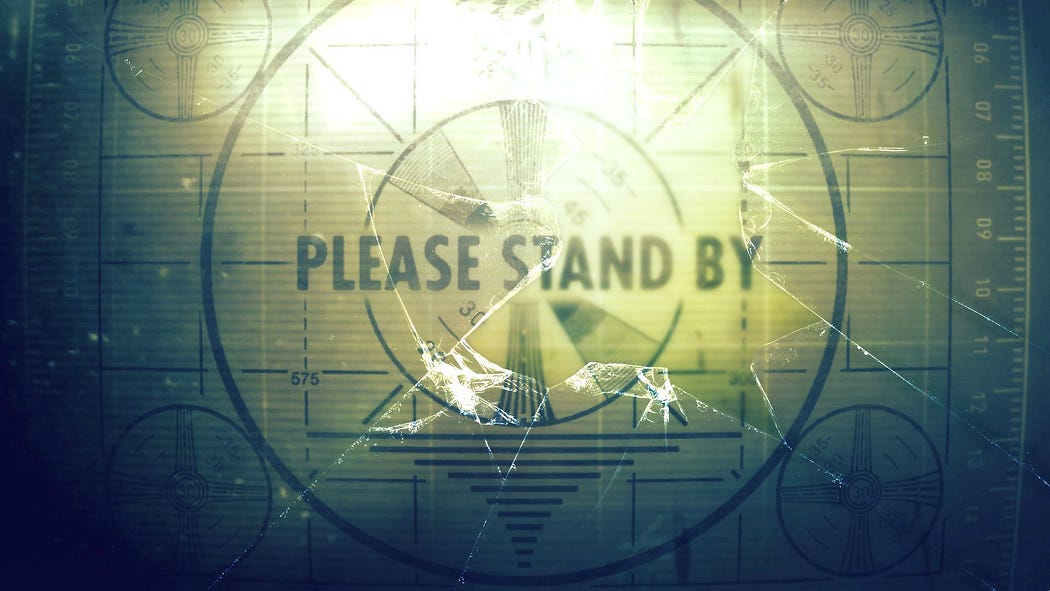
Next: Lore, Stay Tuned!So these are the reviews of characters, in Part 2, I’ll focus on the internal lore inconsistencies. I’ll post it here in the next day or two. The score? That I’m going to leave until the very end, mostly because if a score is given too soon, sometimes no one stops to dissect the reasons for the score, and they may be reasons you don’t agree with. Again, if you see anything I missed or facts got wrong, feel free to comment on it here, social media, or wherever — there may be stuff I missed, and I’m happy to course correct if a viewer saw something I didn’t. What I’d like to avoid, however, is anything that’s a speculative answer (“Well, what I imagined was…”) or “well, they’ll probably solve it in Season 2,” because I heard those two refrains waaaaay too often when asking questions about the series earlier. See you soon, and thanks for reading. 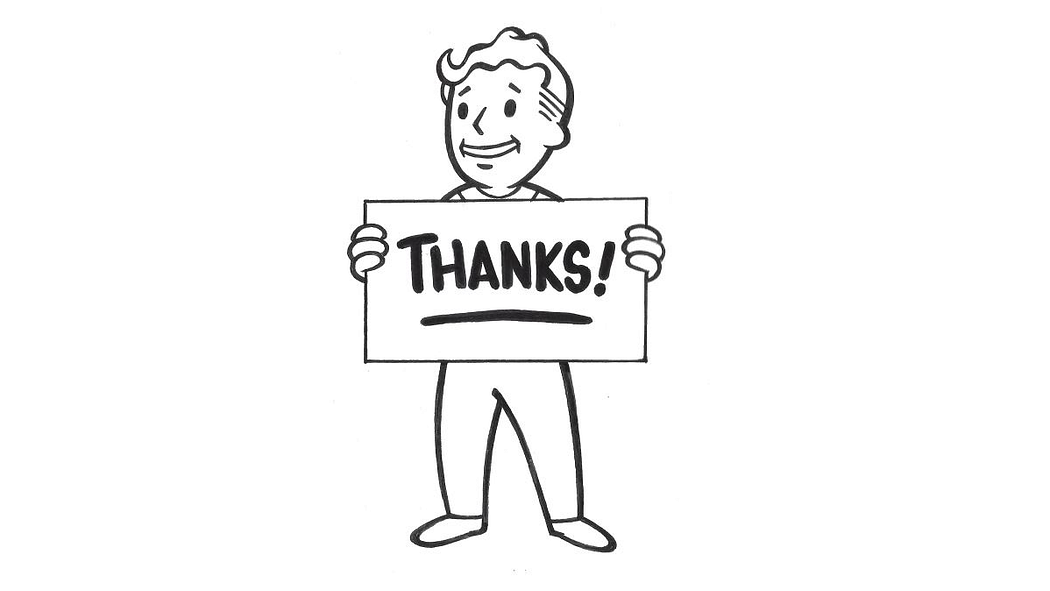
| ![]() 沪公网安备 31010702007642号 )
沪公网安备 31010702007642号 )